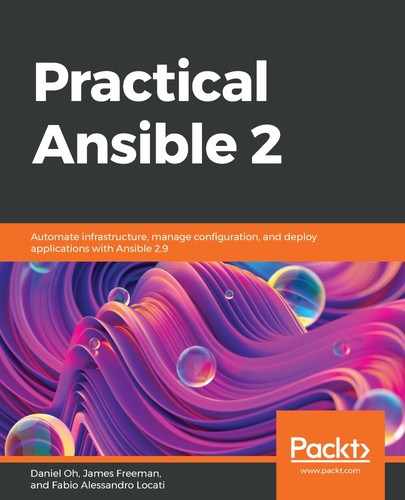When working with clusters, you will sometimes encounter a task that should only be executed once for the entire cluster. For example, you might want to upgrade the schema of a clustered database or issue a command to reconfigure a Pacemaker cluster that would normally be issued on one node and replicated to all other nodes by Pacemaker. You could, of course, address this with a special inventory with only one host in it, or even by writing a special play that references one host from the inventory, but this is inefficient and starts to make your code fragmented.
Instead, you can write your code as you normally would, but make use of the special run_once directive for any tasks you want to run only once on your inventory. For example, let's reuse the 10-host inventory that we defined earlier in this chapter. Now, let's proceed to demonstrate this option, as follows:
- Create the simple playbook as in the following code block. We're using a debug statement to display some output, but in real life, you would insert your script or command that performs your one-off cluster function here (for example, upgrading a database schema):
---
- name: Play to demonstrate the run_once directive
hosts: frontends
tasks:
- name: Upgrade database schema
debug:
msg: Upgrading database schema...
run_once: true
- Now, let's run this playbook and see what happens:
$ ansible-playbook -i morehosts runonce.yml
PLAY [Play to demonstrate the run_once directive] ******************************
TASK [Gathering Facts] *********************************************************
ok: [frt02.example.com]
ok: [frt05.example.com]
ok: [frt03.example.com]
ok: [frt01.example.com]
ok: [frt04.example.com]
ok: [frt06.example.com]
ok: [frt08.example.com]
ok: [frt09.example.com]
ok: [frt07.example.com]
ok: [frt10.example.com]
TASK [Upgrade database schema] *************************************************
ok: [frt01.example.com] => {
"msg": "Upgrading database schema..."
}
---
PLAY RECAP *********************************************************************
frt01.example.com : ok=2 changed=0 unreachable=0 failed=0 skipped=0 rescued=0 ignored=0
frt02.example.com : ok=1 changed=0 unreachable=0 failed=0 skipped=0 rescued=0 ignored=0
frt03.example.com : ok=1 changed=0 unreachable=0 failed=0 skipped=0 rescued=0 ignored=0
frt04.example.com : ok=1 changed=0 unreachable=0 failed=0 skipped=0 rescued=0 ignored=0
frt05.example.com : ok=1 changed=0 unreachable=0 failed=0 skipped=0 rescued=0 ignored=0
frt06.example.com : ok=1 changed=0 unreachable=0 failed=0 skipped=0 rescued=0 ignored=0
frt07.example.com : ok=1 changed=0 unreachable=0 failed=0 skipped=0 rescued=0 ignored=0
frt08.example.com : ok=1 changed=0 unreachable=0 failed=0 skipped=0 rescued=0 ignored=0
frt09.example.com : ok=1 changed=0 unreachable=0 failed=0 skipped=0 rescued=0 ignored=0
frt10.example.com : ok=1 changed=0 unreachable=0 failed=0 skipped=0 rescued=0 ignored=0
Notice that, just as desired, although the playbook was run on all 10 hosts (and, indeed, gathered facts from all 10 hosts), we only ran the upgrade task on one host.
- It's important to note that the run_once option applies per batch of servers, so if we add serial: 5 to our play definition (running our play in two batches of 5 on our inventory of 10 servers), the schema upgrade task actually runs twice! It runs once as requested, but once per batch of servers, not once for the entire inventory. Be careful of this nuance when working with this directive in a clustered environment.
Add serial: 5 to your play definition and rerun the playbook. The output should appear as follows:
$ ansible-playbook -i morehosts runonce.yml
PLAY [Play to demonstrate the run_once directive] ******************************
TASK [Gathering Facts] *********************************************************
ok: [frt04.example.com]
ok: [frt01.example.com]
ok: [frt02.example.com]
ok: [frt03.example.com]
ok: [frt05.example.com]
TASK [Upgrade database schema] *************************************************
ok: [frt01.example.com] => {
"msg": "Upgrading database schema..."
}
PLAY [Play to demonstrate the run_once directive] ******************************
TASK [Gathering Facts] *********************************************************
ok: [frt08.example.com]
ok: [frt06.example.com]
ok: [frt07.example.com]
ok: [frt10.example.com]
ok: [frt09.example.com]
TASK [Upgrade database schema] *************************************************
ok: [frt06.example.com] => {
"msg": "Upgrading database schema..."
}
PLAY RECAP *********************************************************************
frt01.example.com : ok=2 changed=0 unreachable=0 failed=0 skipped=0 rescued=0 ignored=0
frt02.example.com : ok=1 changed=0 unreachable=0 failed=0 skipped=0 rescued=0 ignored=0
frt03.example.com : ok=1 changed=0 unreachable=0 failed=0 skipped=0 rescued=0 ignored=0
frt04.example.com : ok=1 changed=0 unreachable=0 failed=0 skipped=0 rescued=0 ignored=0
frt05.example.com : ok=1 changed=0 unreachable=0 failed=0 skipped=0 rescued=0 ignored=0
frt06.example.com : ok=2 changed=0 unreachable=0 failed=0 skipped=0 rescued=0 ignored=0
frt07.example.com : ok=1 changed=0 unreachable=0 failed=0 skipped=0 rescued=0 ignored=0
frt08.example.com : ok=1 changed=0 unreachable=0 failed=0 skipped=0 rescued=0 ignored=0
frt09.example.com : ok=1 changed=0 unreachable=0 failed=0 skipped=0 rescued=0 ignored=0
frt10.example.com : ok=1 changed=0 unreachable=0 failed=0 skipped=0 rescued=0 ignored=0
This is how the run_once option is designed to work—you can observe, in the preceding output, that our schema upgrade ran twice, which is probably not something we wanted! However, with this awareness, you should be able to take advantage of this option to control your playbook flow across clusters and still achieve the results you want. Let's now move away from cluster-related Ansible tasks and look at the subtle but important difference between running playbooks locally and running them on localhost.
